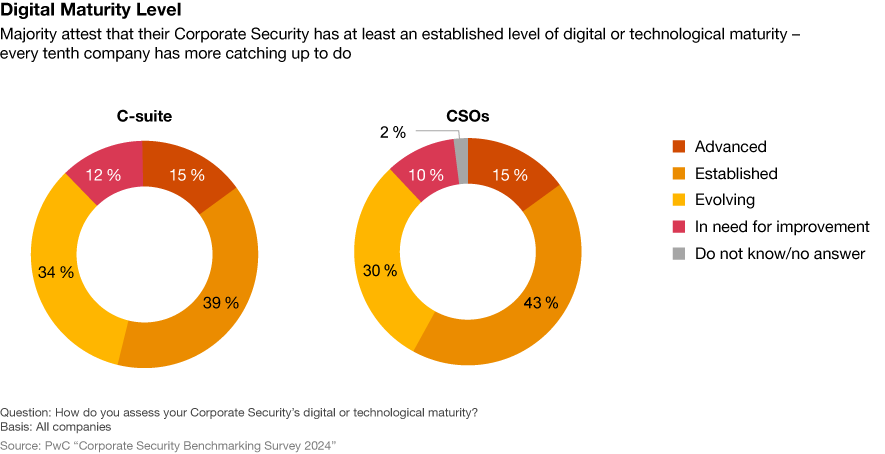
Forensic Services
We help you prepare for, respond to, and emerge stronger from unplanned events.
Whether as a business enabler or crisis manager, Corporate Security has established itself as a reliable anchor in recent years. During times of significant upheaval, such as the war in Ukraine, the economic impact of the COVID-19 pandemic, ongoing tensions in the Middle East, or the volatile dynamics of global trade, companies face numerous challenges. A solid Corporate Security function, which not only responds to risks but also anticipates them, is even more valuable.
For companies to succeed, it is crucial to have a unified understanding of Corporate Security’s responsibilities. Our 2024 Corporate Security Benchmarking Survey shows that Corporate Security emerges in the executive spotlight. Compared to the first study in 2022, the reputation of Corporate Security appears to have increased further, which, according to the respondents, also has an impact on the attractiveness of the function for young talent and thus its future viability.
As a multidisciplinary management function, Corporate Security connects various fields of expertise and interacts with several management disciplines. In their central role, Corporate Security Officers (CSOs) must maintain an overview of strategic and tactical-operational security solutions. Therefore, close communication with the C-suite is essential. Following the initial survey in 2022, we have once again examined how corporate leadership and Corporate Security representatives perceive the roles and attitudes of their Corporate Security.
Compared to the first edition, it is evident that the C-suite and CSOs are more closely aligned in their perceptions and agree on many points. Whether it concerns Corporate Security’s attractiveness, talent strategies, or obstacles that hinder CSOs’ work, the views show increased alignment.
In recent years, Corporate Security has positioned itself as both a crisis manager and business enabler. To further cement this status, it is crucial to ensure future readiness, which includes talent acquisition. The good news is that 44% of respondents found their Corporate Security as attractive to young talent as their strategy, IT, or marketing departments. Moreover, 20% of CSOs and 18% of the C-suite considered it more attractive. This result indicates that the work of Corporate Security is recognised and valued.
In addition to attractive working conditions and meaningful job content, each cited by around a quarter of CSOs and the C-suite as advantages, 35% of CSOs highlighted Corporate Security’s diverse tasks. Continuing to visibly communicate and emphasise these aspects – externally and within the company – is advisable. This is particularly important as 81% of CSOs and 78% of the C-suite considered targeted training of their existing employees to be the most effective talent strategy.
Both groups were less concerned about their digital maturity: 43% of CSOs and 39% of the C-suite considered it to be ‘established’, and 15% even rated it as ‘advanced’.

Regarding current challenges and threats, 63% of CSOs and 60% of the C-suite agreed they were sufficiently digitalised. It remains to be seen whether this assessment corresponds to the actual level of digital or technological maturity in an emergency.
As with most other industries, AI applications are expected to play a significant role in Corporate Security in the future. Our survey found that 50% of CSOs and 54% of the C-suite planned to implement AI or already used the technology. However, at around 40%, a significant proportion of respondents did not currently envisage implementation.
Regardless of implementation, over half of the C-suite (52%) believed that AI would increase competition in their industry. However, only 36% of CSOs shared this view, highlighting a notable discrepancy. Despite this, both groups recognised the potential benefits of AI: 54% of CSOs and 56% of the C-suite believed that AI would improve the quality of their Corporate Security services.
Corporate Security bears significant responsibility within the company to identify and mitigate vulnerabilities. This involves maintaining continuous dialogue with other departments, addressing risks, and remaining open to (new) solutions. By enhancing its visibility within the company and clearly communicating its roles and responsibilities, Corporate Security also becomes more attractive to young talent.
“A key to a resilient company lies in active, open dialogue between the C-suite and CSOs. There must be clarity about challenges – and opportunities.”
Jens Greiner,Director, Forensic Services, PwC GermanyCorporate Security Benchmarking Survey 2024
Contact our experts
As part of our Corporate Security Benchmarking Survey 2024, we examined how representatives of the C-suite and CSOs perceived Corporate Security.
The survey was conducted between April and June 2024 among 200 individuals employed in companies from more than 15 industries. The survey participants were evenly divided between CSOs and the C-suite, ensuring comparability. The participants came from companies of three size categories: small (revenue under 500 million €: 46%), medium (revenue between 500 million and 1 billion €: 30%), and large (revenue over 1 billion €: 25%).
